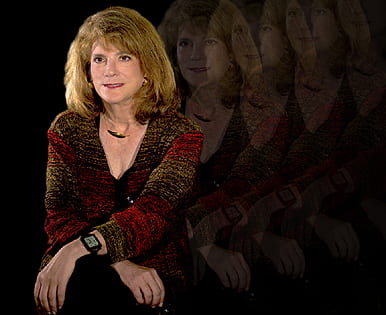Mind games
Psychologist Elizabeth Loftus has redefined the meaning of memories – though some might prefer she hadn’t

Elizabeth Loftus, a stellar addition to the constellation of talent in the School of Social Ecology, could just as easily have found a place in philosophy, literature or even theology.
Her theories on the malleability of thought and memory would delight the secular apostles of David Hume, ignite a blaze of deconstructionism among scholars of Proust, and shake the metaphysical foundations laid by Descartes.
Yet Loftus’ ideas have not been confined to the realm of academic study. From the McMartin Preschool case to allegations surrounding pop star Michael Jackson to the wave of recovered memories swamping the Catholic Church, she has been a contrary voice challenging the purity of remembered truth and the efficiency of the brain’s synaptic storage.
“You have to look into the grateful eyes of just one person who has been falsely accused to know your work really matters,” she says, explaining both a key motivation and an important real-world application for her research.
Earlier this year, Loftus’ research team demonstrated just how impressionable – and fallible – memories can be. In a study presented at the annual meeting of the American Association for the Advancement of Science, subjects who had once visited a Disney theme park were asked to evaluate a print ad which featured a large graphic of Bugs Bunny mingling with visitors, as well as some descriptive text.
In real life, the copyrighted Warner Brothers character would be unlikely to make it past the gift shop at Disneyland before being tackled by a phalanx of attorneys. Yet, despite the improbability of the event, more than 25 percent of volunteers evaluating the ad later vividly remembered meeting the “wascally wabbit” during their visits.
This seemingly light-hearted study has serious implica-tions and, coupled with Loftus’ previous research, has kindled a bonfire of outrage and controversy. No one wants to hear that “recovered” memories of abuse, for example, may have something to do with suggestions, inadvertent or intentional, from a therapist, peace officer, loved one or others – in essence making them false memories.
Indeed, when Loftus shows up on the witness stand, as she often does, to refute repressed memory theories and lament the mind’s ability to embrace suggested chimeras, she makes many people extremely mad. Often they are good people – victims of crime, manipulation or both.
Her testimony also makes some people happy, including a few who may not appear on everyone’s most admired list: criminal defense attorneys, the Menendez brothers and an accused Croatian war criminal.
TESTIMONY TO SUCCESS
Despite the often-passionate criticism such associations engender, her lifetime of work has had its rich rewards. Her bookEyewitness Testimony is a classic text among students and lawyers. The Myth of Repressed Memory, the best-seller she wrote with Katherine Ketcham, sent recovered-memory therapists scurrying, as the press, public and insurance companies began to more closely examine their methods. She was named by the Review of General Psychology as one of the top 100 psychologists of the 20th century. Just half-way down the list from Freud, she is the highest-ranking woman in the pantheon. And she recently earned the 2003 Distinguished Scientific Award for the Application of Psychology from the American Psychological Association.
As a longtime professor at the University of Washington, Loftus was courted over the years by Duke, Harvard, UC San Diego and Emory. “The timing was right for this,” she says of becoming a Distinguished Professor of Social Ecology at UCI. “The place is wonderful. The colleagues are stupendous.”
Ronald Huff, dean of social ecology, is just as effusive about Loftus’ move. “She already is having an impact on applications to our graduate programs, which are up significantly in part due to her visibility and stature in the field,” he reports.
“There is so much more to learn about the tricks our minds play on us,” Loftus says, contemplating future directions in her research and career.
The possibilities seem as far-reaching as her expectations of herself and her UCI colleagues. “We are on the brink of creating what could be the leading law and psychology program in the world,” she says. Her lab already is testing memory suggestion techniques that may one day be used to plant a revulsion to crack into the minds of addicts, or an aversion to super-sizing into the minds of overeaters.
“She is a real joy to have as a colleague,” Huff adds. “She is a team player who is very outgoing, generous with her time, extremely creative and thoughtful, and passionate about her scholarship.”
In the end, Loftus’ work at UCI seems destined to be influential, controversial, intriguing – and, appropriately, well-remembered.